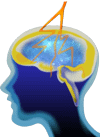Alzheimer Disease treatment in Mumbai
Alzheimer’s Disease
Alzheimer’s disease is the most prevalent type of dementia, accounting for over 60% of diagnoses globally, and is the most frequent form of early onset dementia, accounting for approximately one-third of all dementia patients under the age of 65.
A small proportion of individuals develop Familial Alzheimer’s disease (FAD), which is caused by a defective gene that runs in families. Symptoms of FAD usually appear before the age of 65, most often in the 40s or 50s.
People with Down syndrome and other learning difficulties are more likely to acquire dementia at a young age. Alzheimer’s disease is the most common cause of dementia among persons with Down syndrome.
What factors contribute to Alzheimer’s Disease?
- The specific reason is unclear, that amyloid (plaques) and tau (tangles) occur in the brain as a result of two proteins named amyloid (plaques) and tau (tangles) (tangles).
- Amyloid is a naturally occurring protein that, for unknown reasons, starts to malfunction, producing beta-amyloid, which is toxic to brain cells. Plaques originate from dead cells and amyloid protein.
- Tau protein exists normally in the brain and aids brain cell communication; but, for unknown reasons, it may become aberrant and “clump together,” resulting in the death of the brain cells involved.
- People with Alzheimer’s disease may also have a decrease in a chemical in the brain (called acetylcholine). This substance acts as a chemical messenger, transporting information to and from brain cells (neurons), hence a decrease in this molecule results in ineffective information transmission.
How does Alzheimer’s Disease progress?
According to research, changes in the brain may develop up to 10 years before a person exhibits signs of Alzheimer’s disease. Symptoms are generally minor at first and progressively develop over time. These might include:- Having problems recalling current events yet having an excellent memory for old events
- Inability to concentrate
- Having trouble recognising persons or items
- lack organisational abilities consternation
- Disorientation
- Speech that is sluggish, confused, or repetitious
- Problems with decision-making, problem-solving, planning, and job sequencing
Managing Alzheimer’s Disease’s Consequences
- There are certain drugs that may relieve some of the symptoms and make life a little easier. These drugs may also delay the course of Alzheimer’s disease in some individuals for a short period of time, but they do not prevent or cure the illness.
- Cholinesterase inhibitors are a kind of drug that may be recommended to Alzheimer’s patients. There are three choices: Galantamine, Rivastigmine, or Donepezil
- These drugs may boost concentration, which aids memory, thinking, and language. These effects may remain for six to twelve months, while there is some indication that the advantages may stay much longer. They aid in the transmission of nerve cells in the brain by inhibiting the breakdown of a neurotransmitter known as acetylcholine.
- In the moderate to severe stages of Alzheimer’s disease, memantine may be administered in addition to one of the preceding drugs. This drug counteracts the effects of too much glutamate in the brain. Memantine may be beneficial for memory, thinking, language, and concentration.
For more information & consultation on Alzheimer Disease treatment in Mumbai Call our expert Dr. Amit Shah – Consultant Neurologist in Mumbai on 9819561456 or Book an Appointment

